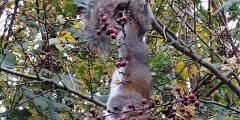Artificial intelligence, dark matter and common sense
January 13, 2023
In my last post I wrote about a new type of deep learning network, the chatbot ChatGPT, which has stirred up a lot of debate, including between me and my sister. We were skyping and I mentioned the blog post and she said: “Oh, I have just read something in the New York Times that …
Making Science Public 2022: End of year round-up of blog posts
December 9, 2022
This is now the 10th time that I have written an overview of the blog posts I have published over the preceding year. Phew! How time flies. Strangely, this year has been quite productive. I have posted more stuff about Covid, of course, but also about monkey pox, as well as about climate change, gene …
Immunity debt: Creating and contesting metaphors
December 2, 2022
This week I am writing a post about my probably last Covid metaphor: immunity debt. What do people mean by that, I wondered? While trying to find out, I became aware of how slippery a concept this is; so I apologise in advance for misunderstandings. In 2021 a French group of researchers published a paper …
Scientists do metaphor
November 18, 2022
I was idly browsing my Twitter timeline recently (probably for the last time), when my eyes fell on some tweets by Buzz Baum, a cell biologist, saying that he had spoken about metaphor on a BBC radio programme (oh, I thought!) which unfortunately had now been deleted from BBC Sounds (oh no, I thought). He …
Invasion as a metaphor
November 4, 2022
On 31 of October Suella Braverman, Home Secretary of the United Kingdom, said, according to Hansard, the official report of all Parliamentary debates: “The British people deserve to know which party is serious about stopping the invasion on our southern coast, and which party is not.” ‘Invasion’ is generally defined as the “action of invading …
Resisting metaphors: The case of trickle-down economics
October 3, 2022
I have recently been corresponding with Ahmed Abdel-Raheem, a metaphor researcher who is developing a theory of metaphor resistance. Ahmed is looking at how producers of metaphors deal with metaphor failure in various ways (denying it was a metaphor, reinterpreting it etc.) and how metaphor audiences or viewers can resist metaphors, be they verbal or …
Monkeypox and metaphors
August 19, 2022
Again and again, I have come across standard ways of metaphorically framing infectious diseases and their spread, be it foot and mouth disease, avian influenza, swine flu, SARS, Zika, Covid, and now monkeypox. War and invasion metaphors are used abundantly, but also fire, wave and flood metaphors, landscape metaphors like valleys and peaks and much …
Invasion of the covid metaphor
August 12, 2022
This post is cross-posted from the i-human Covid-19 blog (University of Sheffield). It summarises a chapter I wrote for the book Being Human during Covid-19. I’d like to thank the editors of the book for both inviting me to write the chapter and giving me the opportunity to blog about it. *** As Milan Kundera said in …
The dance of creation and the music of the stars
July 29, 2022
Everybody will now have seen pictures of the cosmos beamed down to earth by the James Webb Space Telescope (JWST). These images provoked admiration, awe and wonder – they were indeed sublime. In this post won’t explore these cosmic images themselves but some of the language that was used to talk about them. Deep field …
Gene drive in the press: Between responsible research and responsible communication
June 17, 2022
Gene drive is a controversial genetic engineering technique that allows scientists to modify genes so that they quickly spread through a population without following the typical rules of heredity; this can include genes that are of no benefit to the plant or animal involved. Research into gene drives has accelerated since 2015 when another new …
Subscribe by email
About this blog
This blog promotes discussion of topics related to the research programme 'Making Science Public: Challenges and Opportunities'. Our purpose is not to 'make science public'. Instead, we want to study the opportunities that have emerged for science to be more openly practiced and debated, but also the challenges posed by making science public or by promoting the making public of science as a solution to a variety of problems in society and in politics.
This blog will report on these and other issues related to the Leverhulme funded research programme: Making Science Public: Challenges and Opportunities
Useful links
Recent Posts
 MSP bookmarks
MSP bookmarks
- Twitter May 8, 2017
- Social innovations in Europe #RRI November 3, 2015
- Harvey Graff, the undisciplinarian September 20, 2015
- Replacing Pesticides With Genetics August 31, 2015
- Addressing hazardous chemicals in the circular economy August 25, 2015
Categories
- antibiotics
- anticipatory governance
- artifical intelligence
- big data
- biotechnology
- citizen science
- Climate Change
- Climate Politics
- co-production
- coronavirus
- Creationism
- Definition of Science
- designer babies
- disease
- disease
- engineering
- epigenetics
- Food Security
- Food sovereignty
- gene drive
- genomics
- GM Food
- GMOs
- history of science
- Hype
- images and visualisations
- imaginaries
- Immigration
- Impact
- infectious diseases
- innovation
- interdisciplinarity
- Knowledge Society
- Language
- Markets
- Metaphors
- microbiome
- neoliberalism
- Neuroscience
- open access
- Personal Reflection
- Politics
- Public education
- public engagement with science
- public needs
- public participation
- public policy
- public service
- publics
- regulatory science
- Religion
- Republican Party
- research impact
- responsible innovation
- responsive research
- Richard Dawkins
- risk
- Scepticism
- Science
- Science and Government
- science and politics
- Science and Songs
- science communication
- Science Communication
- Science Fiction
- Science Policy
- Social science
- sociology
- space
- space exploration
- synthetic biology
- transparency
- Trust
- Uncategorized
- Uncertainty
- visualisation
- wonder




![Hand-painted Kintsugi pottery bowl. Wikimedia Commons [Kintsugi, also known as kintsukuroi, is the Japanese art of repairing broken pottery by mending the areas of breakage with lacquer dusted or mixed with powdered gold, silver, or platinum]](https://blogs.nottingham.ac.uk/makingsciencepublic/files/2022/11/Hand_Pinted_Kintsugi_Pottery_Bowl-240x120.jpg)




